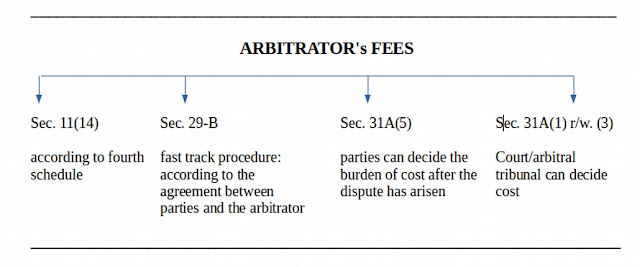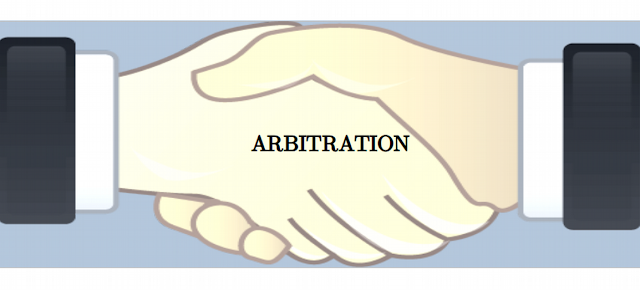HOW TO DETERMINE ARBITRATOR'S FEES? ARBITRATION ACT
¶23. It is necessary to find an urgent solution for this problem to save arbitration from the arbitration cost. Institutional arbitration has provided a solution as the Arbitrators' fees is not fixed by the Arbitrators themselves on case to case basis, but is governed by a uniform rate prescribed by the institution under whose aegis the Arbitration is held. Another solution is for the court to fix the fees at the time of appointing the arbitrator, with the consent of parties, if necessary in consultation with the arbitrator concerned. Third is for the retired Judges offering to serve as Arbitrators, to indicate their fee structure to the Registry of the respective High Court so that the parties will have the choice of selecting an Arbitrator whose fees are in their `range' having regard to the stakes involved.
¶24. What is found to be objectionable is parties being forced to go to an arbitrator appointed by the court and then being forced to agree for a fee fixed by such Arbitrator. It is unfortunate that delays, high cost, frequent and sometimes unwarranted judicial interruptions at different stages are seriously hampering the growth of arbitration as an effective dispute resolution process. Delay and high cost are two areas where the Arbitrators by self regulation can bring about marked improvement.- Union of India v. Singh Builders Syndicate, 2009 (4) SCC 523 reiterated in Sanjeev Kumar Jain v. Raghubir Saran Charitable Trust & Ors. [(2012) 1 SCC 455]
INTRODUCTION
One of the forethoughts before entering into an arbitration agreement is regarding the procedural fees and arbitrator's fees. An Arbitrator is paid for adjudicating the rights and liabilities of the parties and finally rendering a judgment, which is known as an award. It is often postulated by experts that arbitration is cheaper than litigation. However, in most cases, alternative dispute resolution is not as cost effective as litigation. But alternative dispute resolution is effectively faster providing quick redressal, whereby giving an edge over litigation. In India, litigation can be turn out to be comparatively more time consuming than alternative dispute resolution. Benjamin Franklin was thoroughly aware of the intrinsic value of time, as he said: "Time is Money".An effective arbitration clause/arbitration agreement is a prerequisite to commencing arbitration. Mostly parties focus on the arbitration clause/agreement and forget another significant issue i.e., cost of the arbitration (including procedural fees and arbitrator's fees). If parties refer their dispute(s) to arbitration, it is imperative to be acquainted with the predictability of costs.
Note: Explanation of Section 31A (1) defines 'Costs' as reasonable costs relating to-
(i) the fees and expenses of the arbitrators, Courts and witnesses;
(ii) legal fees and expenses;
(iii) any administration fees of the institution supervising the arbitration;
and
(iv) any other expenses incurred in connection with the arbitral or Court proceedings and the arbitral award
ARBITRATOR'S FEES
The Arbitration and Conciliation Act, 1996 (hereinafter 'the Arbitration Act') or any other Arbitration statute has the very foundation of party autonomy. This can be construed by the often used phrase 'Unless otherwise agreed by the parties', whereby giving parties absolute power to decide the procedure of the arbitration. The procedure of the arbitration also includes the Arbitrator's fees. The arbitrator can be removed if they refuse to accept the arbitrator's fees agreed by the parties [National highways Authority Limited v. Gammin Engineers and Contractors Pvt. Ltd.,O.M.P. (T) (COMM.) 39/2018 & IA No. 6559/2018 & 9228/2018 ]THE FOURTH SCHEDULE
Section 11(14) states that " For the purpose of determination of the fees of the arbitral tribunal and the manner of its payment to the arbitral tribunal, the High Court may frame such rules as may be necessary, after taking into consideration the rates specified in the Fourth Schedule.Explanation.- For the removal of doubts, it is hereby clarified that this sub-section shall not apply to international commercial arbitration and in arbitration (other than international commercial arbitration) in case where parties have agreed for determination of fees as per the rules of an arbitral institution.
The abovementioned section may be used by the parties when arbitrator is appointed u/s. 11 of the Arbitration Act. In case the Court refers the appointment of the arbitrator to the designated institution then the determination of fees will be as per institution's rule[See Paschimanchal Vidyut Vitran Nigam Limited v. M/S IL & FS Engineering & Construction Company Limited, O.M.P. (MISC.) (COMM.) 164/2018]. The Fourth Schedule germinates from Section 11(14) of the Arbitration Act and it is the only directive in nature unless the High Court frame such rules. According to my legal understanding, the Fourth Schedule under Section 11(14) of the Arbitration Act fixes the maximum reasonable fees when the arbitrator is appointed by the Court.




